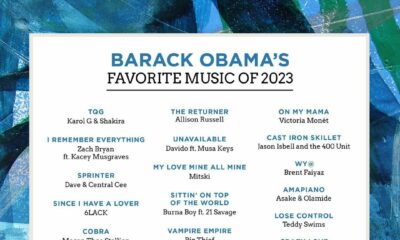Features
Breaking Down the Barriers of Stereotypes
 “The single story creates stereotypes, and the problem with stereotypes is not that they are untrue, but that they are incomplete. They make one story become the only story.” -Chimamanda Adichie
“The single story creates stereotypes, and the problem with stereotypes is not that they are untrue, but that they are incomplete. They make one story become the only story.” -Chimamanda Adichie
Chimamanda Adichie is a beautiful soul. Her writing, representative of the struggle encountered by the people of Eastern Nigeria, has given a voice to the voiceless. I have a bit of a crush on her, which is anchored on the fact that in a world populated by bipolar extremes, she comes across as a perfectly balanced being. Pretty but approachable; well-dressed but not intimidating, intelligent in the most non condescending manner possible. High achiever, yet still humble. When she talks, a lot of us listen. In July 2009, she delivered a Ted Global speech in which she highlighted the danger of the single story. The video went viral. The premise of her argument was that as an African writer, she felt an obligation towards challenging the stereotypes and limitations that were unrepresentative of reality. She explained that as a child, her stories were set from an ‘oyibo’ perspective. She said “I wrote exactly the kinds of stories I was reading: All my characters were white and blue-eyed, they played in the snow, they ate apples, and they talked a lot about the weather, how lovely it was that the sun had come out. (Laughter) Now, this despite the fact that I lived in Nigeria. I had never been outside Nigeria. We didn’t have snow, we ate mangoes, and we never talked about the weather, because there was no need to. My characters also drank a lot of ginger beer because the characters in the British books I read drank ginger beer. Never mind that I had no idea what ginger beer was.” Gradually, her roots found a way into the picture thanks to the likes of Chinua Achebe and Camara Laye and this helped inspire the texts which have inspired the love and regard in which we hold her.
Touré Neblett, simply known as Touré is an African-American essayist, writer and journalist, and a Contributing Editor to Rolling Stone magazine, develops this thesis of Adichie’s in his book, ‘Who’s Afraid of Post Blackness?’. The book shines light on and explores the era of Post Blackness which would best be described as an era filled with protagonists who take pride in their being black but are not hindered or limited by the politics of race and identity. This definition is best encapsulated by the likes of Barack Obama and Oprah Winfrey, two people who have battled against racial limitations to reach the top. In working on the book, Touré interviewed stalwarts of the African American community like Al Sharpton , Cornel West and Jesse Jackson, music artistes like ?uestlove, Lupe Fiasco, Chuck D and Talib Kwali amongst other literary and artistic figures. Touré’s book is a better detailed exploration of Adichie’s aforementioned argument. The first chapter’s titled ‘40 Million Ways to be Black’ and it seeks to tear apart the paradigm that certain acts shouldn’t be carried out by Black people. “How can you go skydiving? Black people don’t do such”….”Why do you donate to an animal cruelty cause? Since when did black people care about animals?” When did one’s ethnicity become a determinant of one’s behavior and character traits?
Rick Ross, the robust and husky voiced American rapper released a Nigerian video version to his song ‘Hold Me Back’. The video was shot in Lagos about a month ago while Ross was there to fulfill a concert date. There are references to the Civil War and the deceased Rashidi Yekini at USA ‘94. The video captures some of the grittier elements of Lagos–the gutter side food-seller (Mama Put), roadside garbage, stray goats, old lady hand washing clothes, indecently dressed children, plantain chips hawkers, street fights, and the street beggar. Like all other pieces of art, the video and song have been subjected to all sorts of interpretations. To some, it is an indictment on the state of affairs in Nigeria. It is viewed as disrespectful and distasteful to portray the poverty in Lagos in the light Ross has proceeded to. They argue, the nation is filled with infrastructure that would portray Nigeria better.
That I assure you that a government release lamenting on the video is not far off. I personally am not sympathetic to the government as I believe that their focus should be on taking actions that would allow more of the ‘good Nigeria’ to become the norm and not chasing after good press. Some have argued that that school of thought is being unnecessarily sensitive. They argue that on a simplistic level the song and video signify a taunt to those enemies of progress that despite obstacles and barriers, success is around the corner. By playing on the Lagos slums, Ross shows that even in a society where the system and infrastructure aren’t as one would like, one can’t be held back with the right mindset.
All this is subjective. However, what is certain is that whether knowingly or unknowingly Ross has played into the idea of the single story and stereotypes. He has fed the idea that Lagos and Africa is the land of jungle justice. He highlights the filth and deplorable conditions that the stereotypical view would suggest. The sad reality is that this would become the abiding memory of Nigeria to some and that is unfair and has set back the work of Chimamanda and Toure in their bid to challenge larger society to break down the mental slavery and deficient reasoning.
Maybe, if it made our leaders sit up, it would all be worth it.
Photo credit: jaclynhawtin.com
_______________________________________________________________________________________________________
OluwaMayowa Idowu is a blogger, writer and Web Journalist. His work can be found on http://mayowaidowu.com . You can also follow him on Twitter @MayowaIdowu | http://shutterfeeds.com























